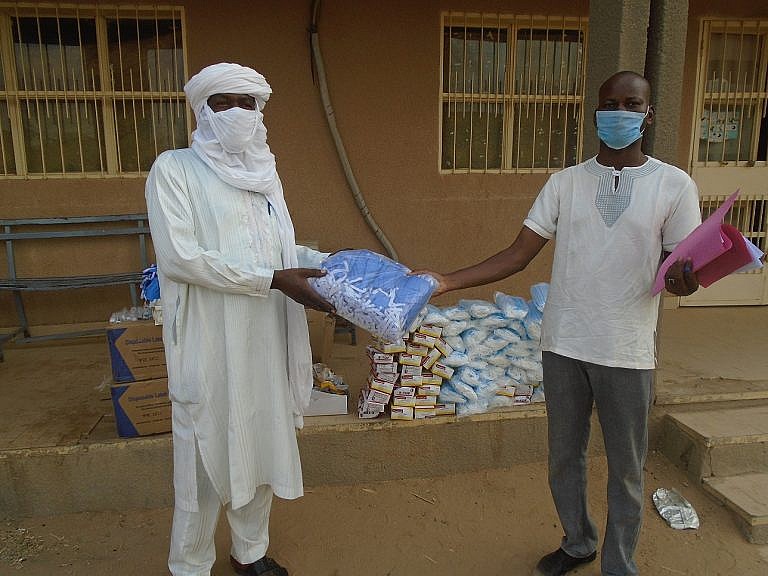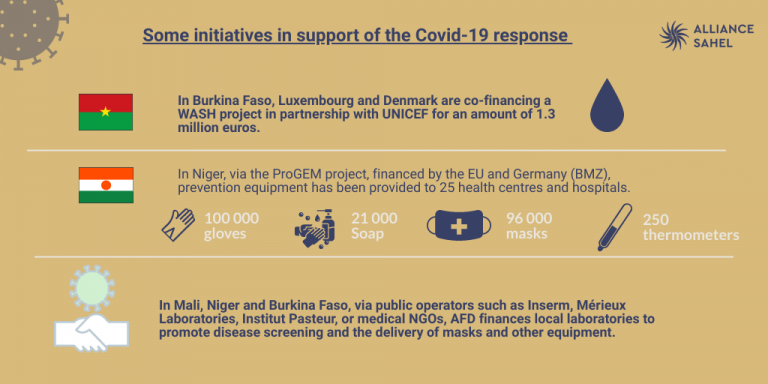The Sahel Alliance committed to the G5 Sahel countries in the Covid-19 response

The security and humanitarian crisis affecting the development of the G5 Sahel region is compounded by the health and socio-economic consequences of the COVID-19 pandemic. In addition, many humanitarian actors fear a sharp deterioration in food security in the coming months. The already precarious nutritional situation is likely to deteriorate during the lean season from June to August 2020.
Faced with these interdependent crises exacerbating fragility, the members of the Sahel Alliance are mobilized to support, bilaterally and multilaterally, the response implemented by the G5 Sahel States in terms of health and food emergencies but also and above all in the medium and long term to mitigate the socio-economic impacts and strengthen the resilience of populations.
The members of the Sahel Alliance contribute in particular to the coordination efforts of WHO and OCHA. Direct aid is being provided through partnerships with health and humanitarian actors, including WHO, WFP, UNICEF, UNHCR, ICRC and several NGOs. In addition, new fund-raising activities, reallocation of funding for existing programmes, as well as direct budgetary aid to States and the supply of equipment (in particular for the strengthening of health systems) have been set up. Financing for the health sector and support for economic activity are predominant and ensure that they promote inclusion, strengthen resilience and will be adapted to the evolving situation.
In this context, the European Union organised the donors’ conference on 4 May this year, making it possible to mobilise EUR 7.4 billion to combat the virus. All the main international partners attended and contributed financially, including France, Germany, Italy, Spain, the United Kingdom, Japan, Canada, the United Nations and the World Bank. The funds will be used to develop and provide effective diagnostics, treatments and a vaccine that is available worldwide at an affordable price.
Coordinated action at several levels
Fully invested in the coordination of aid at the local level through consultation frameworks between technical and financial partners and the G5 Sahel authorities, the members of the Alliance also coordinate within the framework of a working group dedicated to the Covid-19 response. Information sharing and the search for synergies and joint actions, are also implemented, in accordance with the founding principles of the Alliance and the conclusions of the General Assembly of 25 February 2020. It should also be noted that, within the European Union, coordination has been established between the member states and the European institutions, making it possible to adopt a common and united position around “Team Europe”.
In the months to come, the coordination and support actions of the Sahel Alliance will continue to be aligned with national priorities, particularly with regard to the health and socio-economic aspects of the response to the pandemic. In addition, the members of the Sahel Alliance will continue to strengthen their coordination in supporting and protecting food systems, ensuring that supply chains remain functional.
In view of the complexity and increasing volatility of the crises simultaneously affecting the Sahel region, it is essential for the members of the Sahel Alliance to meet the needs of the G5 Sahel States and populations in the best possible way, without crowding out current and future commitments.
—

Some examples of Covid-19 response initiatives supported by the Sahel Alliance:
- In Burkina Faso, Luxembourg and Denmark are co-financing a WASH project in partnership with UNICEF (‘1.3 million);
- In Niger, Luxembourg is contributing to the project to strengthen the resilience of the Nigerien public health system led by the Belgian Development Agency (Enabel) (‘1.6 million);
- In Niger, via the ProGEM project, financed by EUTF & BMZ, prevention equipment has been delivered to 25 health centres and hospitals. 100,000 gloves, 96,000 surgical bibs, 21,000 soaps, 300 hand washing devices and 250 thermometers were distributed to various communes in the country;
- In Mali, Niger and Burkina Faso, AFD finances local laboratories via public operators such as Inserm, Mérieux Laboratories, Institut Pasteur, or medical NGOs such as ALIMA, to promote disease screening and the delivery of masks and other equipment necessary for the safety of populations;

